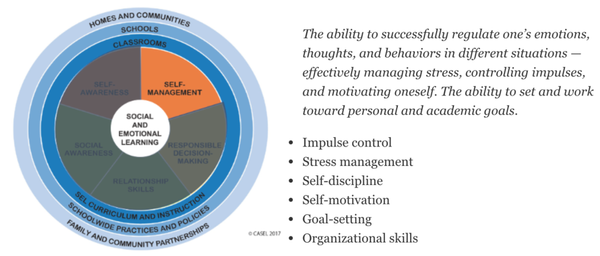
Self-Management
The abilities to harness one's emotions, thoughts, and behaviors effectively in different situations and to achieve goals and aspirations. This includes the capacities to delay gratification, manage stress, and feel motivation and agency to accomplish personal and collective goals.

We can help students articulate feelings and resolve conflicts effectively by using charts, pictures, puppets, guides, and more.
👩🏫 Leaders can guide students through conflict resolution.
📊 A problem-solving chart aids communication.
😢 Students learn to express their feelings.
🤔 Identifying problems is a key step.
💬 Students brainstorm possible solutions.
😊 Emotional check-ins help gauge feelings post-resolution.
🧸 Puppets can assist in calming and engaging children.
🌱 Emotional Awareness: Teaching children to recognize and articulate their emotions fosters emotional intelligence, essential for their development. Understanding feelings like anger or sadness is the first step to resolution.
🗣️ Communication Skills: Utilizing the problem-solving chart encourages verbal expression among young children, improving their ability to communicate needs and resolve disputes.
🧩 Structured Approach: Establishing a clear protocol for conflict resolution helps children feel secure knowing their problems will be addressed, promoting a positive classroom environment.
🧘♂️ Calmness Before Solutions: Children sometimes struggle to solve problems when upset. Encouraging them to calm down first creates a conducive environment for productive problem-solving.
🎭 Engagement Strategies: Using puppets as tools for conflict resolution makes the process engaging and relatable for children, enhancing their willingness to participate.
🤝 Peer Interaction: The chart promotes not just individual problem-solving but also collaborative resolution, teaching children the value of teamwork and communication.
🌈 Long-term Skills: The ultimate goal is to empower children to independently navigate conflicts, equipping them with lifelong self-management skills.
Self-regulation skills are essential for personal growth and effective decision-making, helping individuals manage emotions and behaviors.
🧠 Self-regulation promotes emotional control.
🎯 It enhances goal-setting and achievement.
🤝 Builds better relationships through improved communication.
📚 Fosters resilience during challenges.
⏳ Increases time management abilities.
🔄 Encourages adaptability in changing situations.
🌱 Contributes to overall mental well-being.
🧘♂️ Emotional Control: Mastering self-regulation allows individuals to manage their emotions effectively, leading to more thoughtful responses rather than impulsive reactions. This skill is crucial in both personal and professional environments.
🎯 Goal Achievement: Self-regulation aids in setting and reaching goals by maintaining focus and motivation, helping individuals stay on track even when faced with distractions or setbacks.
🤝 Improved Relationships: By fostering better communication and understanding, self-regulation can significantly enhance interpersonal relationships, leading to more productive and harmonious interactions.
📈 Resilience: The ability to self-regulate helps individuals bounce back from failures and challenges, equipping them with the tools to cope with adversity and maintain a positive outlook.
⏳ Time Management: Effective self-regulation allows for better prioritization and organization of tasks, which is essential for maximizing productivity and meeting deadlines.
🔄 Adaptability: Self-regulated individuals can adjust their behavior and strategies according to the situation, making them more flexible and responsive to change
🌟 Mental Well-Being: Developing self-regulation skills contributes to improved mental health, as individuals learn to manage stress, anxiety, and other negative emotions more effectively.


